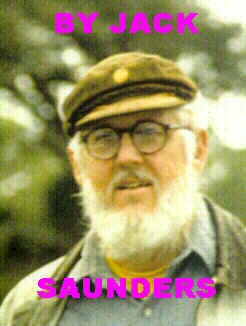
 sm
smSECTION TEN

 sm
sm
COLUMN FORTY-FIVE, MAY 1, 1999
(Copyright © 1999 Al Aronowitz)
THE SHAKESPEARE SQUADRON (PART 2):THOREAU AND WHITMAN

(Photo by Brenda Saunders )
What to write now? Cosmos had nothing but time on his hands.
He decided to interview some of his heroes. He'd start with Thoreau.
Thoreau lived in a cabin outside town. You often saw him walking by, engrossed in thought. One sock on. He was a figure of ridicule, like the caricature of Kierkegaard, walking around Copenhagen in a clawhammer coat.
In fact, every now and then, you saw Kierkegaard. But Kierkegaard and Thoreau avoided each other like two men reciting Shakespeare at opposite ends of the bar.
Cosmos walked up to Thoreau's cabin and knocked on the door.
He heard heavy breathing inside. It stopped. Must have been the VCR.
Thoreau opened the door.
What?" he said.
Cosmos introduced himself.
"May I ask you some questions about your work?" he asked.
"It's in the books," Thoreau said. "Read the books.
"I don't write so much anymore. I am discovering my inner person.
"Our discussion group is a help to me. You might want to attend a meeting.
"Do you know Virginia Woolf? Such elegant feet!"
"A lot of women in that group?" Cosmos asked.
"Listen," Thoreau said. "I'm being rude. Would you like some guacamole dip and potato chips? I have mineral water or fruit juice."
Cosmos declined. The room had a kind of a sour smell. He wanted to get back out in the fresh air.
"I think I'll run along," he said. "Sorry to have bothered you."
"Keep up the good work," Thoreau said. Was he adopting an ironic stance? Are we all postmodernists, a back-formation from the theory that spread through literature like a virus, pulling everything in after it like a black hole, to mix a metaphor? Disappearing up its own asshole? And if so, what good would it do Cosmos to talk to anyone: he'd just stuff them into his preconceived framework.
He'd work it out on his walk. And at his typewriter.
There was plenty of time.
There was nothing but time. And heaven and hell were of our own making. Were the same place, depending on how you looked at it. It was all a question of attitude.
Thoreau was a fraud. His oeuvre a Potemkin Village. He was a lonely man, who thought the world would let him stroll and ponder, think beautiful thoughts, and when the world didn't, when he had to move back in with his parents and work in the family business, he died of disappointment.
Cosmos thought of Barton Fink turning on Faulkner when he learned Judy Davis had written his books.
"The grand productive days," he said, his voice dripping with sarcasm. "That son of a bitch."
Actually, we can't wait to discover that our heroes have feet of clay. It's one of the main motives of criticism and biography.
Bring the giants down to size.
* * *
WHITMAN
Cosmos decided to visit Walt Whitman.
Walking through town he noticed that the Suicide Shoppe had a special on the rocks Virginia Woolf weighted her pockets down with when she drowned herself.
No, wait: they did have cars.
A CitroŽn 2CV went by with a bumper sticker that said I BRAKE FOR DELMORE SCHWARTZ.
Wouldn't Richard Grayson be pleased. They'd better give Randall Jarrell a wide berth, though.
Whitman was sitting on his porch, rocking. Endlessly rocking.
When Cosmos approached, he got up and walked down the drive, to meet him halfway.
He threw his arm across Cosmos's shoulder in a comradely fashion and said, "Let's go for a walk, son."
He had a staff and a musette bag with a Kaiser roll, a hunk of cheese, and a summer sausage in it. The staff reminded Cosmos of the thyrsus Margaret Mead affected.
"The open road for me," Whitman said. He had a pretty good stride for an older man.
"It's true I am a one-book author," he said. "But the book is Leaves of Grass, Specimen Days, and With Walt Whitman in Camden, edited by Horace Traubel."
Cosmos laughed. He called the great continuous book of his life a stack.
"How are things in America?" Whitman asked. "Still crazy and materialistic? In a frenzy to go nowhere? Worshipping technology?"
"Let's just say your heir is Allen Ginsberg."
"I knew it," Whitman said. "When will they learn that Christ was not a Christian, and whoever claims the mantle is an impostor? From the get-go."
"Bukowski knew that," Cosmos said. "He wrote that if you know you haven't any soul left you might have some. But if you think you do, you don't."
"Yes, Bukowski had it. He's up here now. We have some interesting conversations. Most of the academic poets avoid us like the plague, because we make fun of their posturing so bad.
"Wasn't Ginsberg a queer?"
"Yes, and he claimed you were, too."
"Well, there you go. That just goes to show you."
"Thank God your books are out there, in durable cheap editions."
"You said it!"
They spent the afternoon together, walking.
They didn't talk shop talk, but rather, Whitman spoke of nature, friendship, honor.
He encouraged Cosmos to speak. He was a good listener. By the end of the day, Cosmos felt like he'd known Walt forever, and realized that Whitman had let him do most of the talking, nodding in encouragement now and then.
Why, that sly old fox. What people skills. He could have run for office and beat Tip O'Neill in his own district. ##
CLICK HERE TO GET TO INDEX OF COLUMN FORTY-FIVE

CLICK HERE TO GET TO
INDEX OF COLUMNS
The
Blacklisted Journalist can be contacted at P.O.Box 964, Elizabeth, NJ 07208-0964
The Blacklisted Journalist's E-Mail Address:
info@blacklistedjournalist.com
![]()
THE
BLACKLISTED JOURNALIST IS A SERVICE MARK OF AL ARONOWITZ